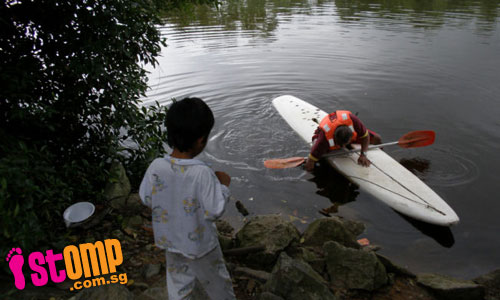
STOMPer Seafarer spotted a bunch of kids collecting mussels and clams at the beach at Kranji Reservoir and feels that exposing them to nature, will help them learn to appreciate it.
Says this STOMPer:
"These pictures were taken at the Kranji Reservoir Park at Kranji Way.
"This family was camping at the park during the weekend. The children enjoyed collecting black mussels and clams at the beach at low tide.
"If children are exposed to the sea at a young age, they would learn to love the sea and outdoor life.
"The view of Johor Bahru with its tall towers from the park.
"Some the bivalves like clams (Marcia marmorata) are washed ashore at low tide."




Indeed, it is vital that children receive early exposure to the outdoors. It is tragic that so many people in Singapore remain disengaged and out of touch with nature, unaware and oblivious to the fact that we sit right smack in a hotspot for biodiversity.
Writer Richard Louv has coined the term Nature deficit disorder to describe this growing phenomenon, where youths prefer to spend time indoors, instead of running around outside and getting acquainted with the little slice of nature that can be found in most neighbourhoods.
Technology is partly responsible; with the Internet, video games, television, and so many other distractions, children are far more likely to spend their free time watching a screen. An increasingly demanding school curriculum and overprotective parents also play an important role in limiting access to the outdoors. Many of us in the older generations bemoan the decline of many childhood activities, from climbing trees, to skulking around in the bushes looking for fighting spiders (Thiania bhamoensis), to catching tadpoles and small fish in streams and drains. With this lack of exposure to running around barefoot on the grass, discovering the multitude of other lifeforms that share our world, what hope is there for our wild places? Are we raising a generation overly dependent on air-conditioning, that demands more and more space be reserved for theme parks and shopping centres?
Children detach from natural world as they explore the virtual one
Do today's kids have "nature-deficit disorder"?
Parents worry about 'nature-deficit disorder' in kids
Instilling an appreciation and love for nature does not require excessive amounts of time and money. Many of our nature areas are easily accessible, and entrance to our parks and gardens is free. One does not need to organise a day-long excursion to Bukit Timah or Sungei Buloh; an afternoon spent in the neighbourhood park is often enough to gain some awareness of the diversity of life that lives around us. There's always a wide variety of upcoming activities up on the Wild Happenings in Singapore blog, catering to people of all ages.
On a personal note, I find that I have this need for what I like to call nature therapy, dedicating a few hours to walking around outdoors with my camera along the beach or in a park, keeping an eye out for interesting sights, and ruminating on various nature and wildlife-related topics. It's very therapeutic and calming, especially when done alone. But it's even more fulfilling to be sharing thoughts and experiences with like-minded people, or to be out guiding, helping others gain some insight into the need for some places to remain just that bit wild and untamed.